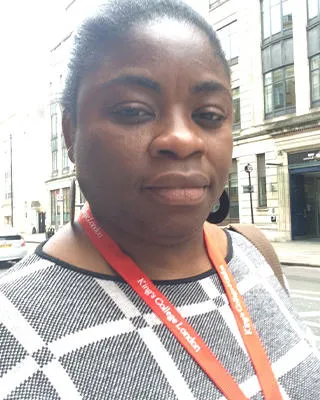09 October 2020
Foundations for Future Care
As it's World Hospice and Palliative Care Day we thought we'd share a story from the Autumn 2018 issue of InTouch about the importance of end of life care.

The Cicely Saunders Institute of Palliative Care, Policy & Rehabilitation is the result of a partnership between King’s and the charity Cicely Saunders International. Opened in 2010 it is the first purpose built institute of palliative care and home to some of the most exciting research in this area.
Anna Bone is in the third year of her PhD. She is studying the impact of population aging on the future impact of end of life care provision.
‘I worked at the Cicely Saunders Institute as a research assistant before embarking on my PhD so I knew that it would be a great place to study for a doctorate. I work with many inspiring academic and clinical colleagues, whose goal of improving care for people living with advanced illness and their families is at the centre of everything they do. There is an evident culture of learning and personal development in the institute, with access to weekly meetings dedicated to methodological skills, critiquing the literature, and reviewing research proposals, which enriches the experience of studying for a PhD.

My research interest is frail older people’s care towards the end of life. As part of my PhD, I studied the impact of population ageing on future end of life care provision. The study aimed to project where people will die from 2015 to 2040 across all care settings in England and Wales. We found that if recent trends continue, the number of deaths in care homes will double over the next 25 years and become the most common place to die. If the reduction of deaths in hospital is to be sustained, there is an urgent need to invest in community services and social care and expand the number of care home places, which are currently in decline. We hope that our analysis model will also be replicated in other nations, to inform policy and improve end of life care provision internationally.'
A Global Perspective
The Cicely Saunders Institute generates research findings that impact the wider global community in a variety of ways. Mary Abboah Offei is in the second year of her PhD where she is developing a community model of care for people living with HIV or AIDS. She is currently conducting research in Ghana.
‘The aim of my study is to develop a person-centred community-based care programme to improve the quality of life for people living with HIV or AIDS. Person-centred and holistic care for people living with HIV or AIDS is a critical area set for fast-track action by the World Health Organization.

By implementing person-centred care in HIV treatment, it could improve the involvement of people living with HIV or AIDS in their own care through collaborative care planning, taking into consideration their preferences, needs and personal values.'
From pioneering prosthetics work, to training nurses, to in depth research that will inform national and global health policy - this work truly embodies King’s mission to ‘serve to shape and transform’. But our efforts are far from over and as we face further health challenges it can be assured that GKT and King’s staff, students and alumni will be there to meet those challenges head on.
This article formed part of the 2018 Autumn edition of InTouch – your alumni magazine. To see the latest edition go to intouch.kcl.ac.uk.

